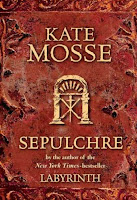Title: A History of English Food
Author: Clarissa Dickson Wright
Year published: 2010
Pages: 455
Time It Took To Read: A couple of months, largely read during meals
I borrowed this signed edition off my Mum a few months ago, and have been gradually getting through it when eating. I read when I eat, because I'm odd like that.
I'm fascinated by what people ate in ye olde days. The lack of detail about food in history, and historical fiction, annoys me. It's such a cliché: kings are always eating vast banquets, whilst commoners nosh down gruel. I've read a few books on the history of eating in Britain, but this is probably the book with the grandest scale. It begins in medieval times and carries on to the present, with a considerable portion of the book dedicated to the last 150 years.
It is exceptionally readable and interesting. I love Clarissa Dickson Wright's presenting style, and her greed and adoration of food - never trust a thin food writer. The book does suffer very slightly from her continuous personal comparison of food then and food now. I see that she's comparing the similarities of diet, particularly in the country, then and now, but it does make her sound like she grew up in 1482, on a tenant farm.
I thoroughly enjoyed the book anyway, and there's a collection of medieval recipes in the back that I'm quite tempted to try. I recommend it to anyone with an interest in food, or British history. Om nom nom.
Book count: 24/50




